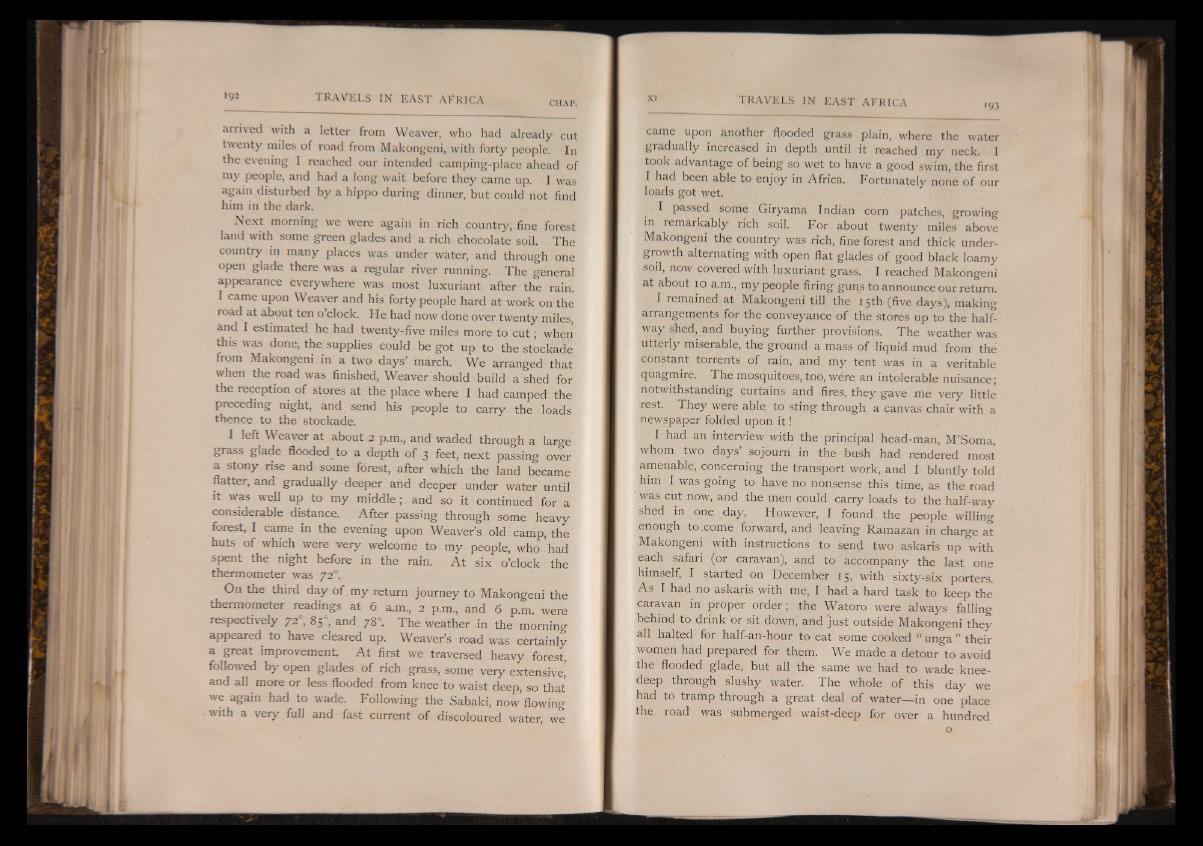
arrived with a letter from Weaver, who had already cut
twenty miles of road from Makongeni, with forty people. In
the evening I reached our intended camping-place ahead of
my people, and had a long wait before they came up. I was
again disturbed by a hippo during dinner, but could not find
him in the dark.
Next morning we were again in rich country, fine forest
land with some green glades and a rich chocolate soil. The
country in many places was under water, and through one
open glade there was a regular river running. The general
appearance everywhere was most luxuriant after the rain.
I came upon Weaver and his forty people hard at work on the
road at about ten o’clock. He had now done over twenty miles,
and I estimated he had twenty-five miles more to cu t ; when
this was done, the supplies could begot up to the stockade
from Makongeni in a two days’ march. We arranged that
when the road was finished, Weaver should build a shed for
the reception of stores at the place where I had camped the
Preceding night, and send his people to carry the loads
thence to the stockade.
I left Weaver at about 2 p.m., and waded through a large
grass glade flooded to a depth of 3 feet, next passing over
a stony rise and some forest, after which the land became
flatter, and gradually deeper and deeper under water until
it was well up to my middle; and so it continued for a
considerable distance. After passing through some heavy
forest, I came in the evening upon Weaver’s old camp, the
huts of which were very welcome to my people, who had
spent the night before in the rain. A t six o’clock the
thermometer was 72°.
On the third day of my return journey to Makongeni the
thermometer readings at 6 a.m., 2 p.m., and 6 p.m were
respectively 720, 85°, and 78°. The weather in the morning
appeared to have cleared up. Weaver’s road was certainly
a great improvement. A t first we traversed heavy forest,
followed by open glades of rich grass, some very extensive’
and all more or less flooded from knee to waist deep, so that
we again had to wade. Following the Sabaki, now flowing
with a very full and fast current of discoloured water, we
came upon another flooded grass plain, where the water
gradually increased in depth until it reached my neck. I
took advantage of being so wet to have a good swim, the first
I had been able to enjoy in Africa. Fortunately none of our
loads got wet.
I passed some Giryama Indian corn patches, growing
in remarkably rich soil. For about twenty miles above
Makongeni the country was rich, fine forest and thick undergrowth
alternating with open flat glades of good black loamy
soil, now covered with luxuriant grass. I reached Makongeni
at about 10 a.m., my people firing guns to announce our return.
I remained at Makongeni till the 15th (five days), making
arrangements for the conveyance of the stores up to the halfway
shed, and buying further provisions. The weather was
utterly miserable, the ground a mass of liquid mud from the
constant torrents of rain, and my tent was in a veritable
quagmire. The mosquitoes, too, were an intolerable nuisance;
notwithstanding curtains and fires, they gave me very little
rest. They were able to sting through a canvas chair with a
newspaper folded upon i t !
I had an interview with the principal head-man, M’Soma,
whom two days’ sojourn in the bush had rendered most
amenable, concerning the transport work, and I bluntly told
him I was going to have no nonsense this time, as the road
was cut now, and the men could carry loads to the half-way
shed in one day. However, I found the people willing
enough to .come forward, and leaving Ramazan in charge at
Makongeni with instructions to send two askaris up with
each safari (or caravan), and to accompany the last one
himself, I started on December 15, with sixty-six porters.
As I had no askaris with me, I had a hard task to keep the
caravan in proper order; the Watoro were always falling
behind to drink or sit down, and just outside Makongeni they
all halted for half-an-hour to eat some cooked " unga ” their
women had prepared for them. We made a detour to avoid
the flooded glade, but all the same we had to wade knee-
deep through slushy water. The whole of this day we
had to tramp through a great deal of water— in one place
the road was submerged waist-deep for over a hundred
o